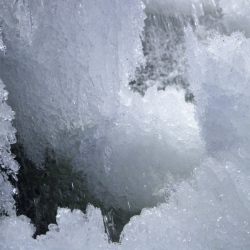
It comes from the north, dragging frigid air and awful commutes like an terrible shroud over the continental United States, from the Rocky Mountains all the way to the Atlantic. While the East Coast saw temperatures about 10 degrees below average, snow hit much of the Midwest following a 40 degree drop over just a couple days.
This morning, in the stairwell of an apartment building, even New York City’s relatively mild mid-30s weather prodded a father into a shouting match with his weeping child: "But I don’t want to go to school today! It’s too cold to go outside!" "Put your coat on, now!" And in the halls of climate research centers and weather stations across the nation, the cold snap is spurring a more technical, but no less divisive debate, one that matters to millions of Americans who remember the last awful winter: Is this the new normal?
With nearly two weeks left before Thanksgiving, this should be a time for tweed and brisk walks through vibrant fallen leaves. Instead, if you live anywhere from Chicago to Appalachia you’ve likely found yourself breaking out the Gore-Tex for a slog through accumulating snow and ice, with more likely coming this weekend, and its all because of a storm on the other side of the world.
Typhoon Nuri formed in the West Pacific and surged north, peaking with sustained winds around 180 miles per hour, one of the strongest typhoons or hurricanes of the year. As it moved past Japan and into the Arctic it weakened, but its powerful remnants still delivered tropical storm conditions to Alaska’s Aleutian Islands, Eastern Russia, and the Bering Strait.
You’d think a mega storm careening off into the underpopulated Arctic would be a kind of best-case scenario, and in many ways it is. There are fewer houses and people out in those cold places, and local damage was minimal. But those sparse communities share air with the polar vortex, a muscular current of air that circles counter-clockwise high in the atmosphere between the warmer air masses of the mid-latitudes and the much colder northern reaches.
